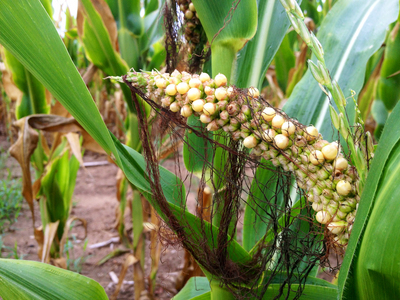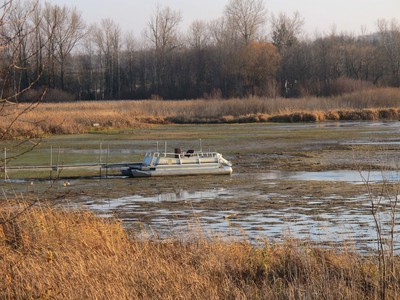Buckeyes could become a fixture in Ann Arbor within the next 100 years if climate change continues on its path, environmental advocates say.
The buckeye tree whose fruit inspired the Brutus mascot for The Ohio State University could be migrating northwards in the near future as global temperatures warm.
It’s one of many effects of climate change that professors from the University of Michigan, as well as representatives from several Michigan environmental organizations, say could be a future reality.
Speaking Friday in a press call on the recently released draft of the National Climate Assessment report, environmental advocates outlined a disconcerting future for the mitten state: Increased heavy rainfall and flood events, more droughts and heat waves, struggling crops, beach erosion and declining water quality.

Drought-damaged corn on July 27, 2012, seen near Lawrence. The drought that hit Michigan in the summer of 2012 is a sign of things to come as a result of climate change, according to a new National Climate Assessment report released in January.
Robert Ray | AP file photo
Don Scavia, a U-M professor and director of the Graham Environmental Sustainability Institute, is one of the lead convening authors of the Midwest chapter of the National Climate Assessment report.
Scavia said the habitats for many iconic tree species in Michigan will likely shift northward into Canada as the average temperature continues to increase.
If no action is taken and carbon dioxide emissions continue at current rates, a five-degree average temperature increase is anticipated by mid-century, Scavia said.
Michigan’s agricultural industry will see major changes, said Frank Szollosi, Midwest outreach coordinator for the National Wildlife Federation’s Great Lakes Regional Center.

Unusually low water levels on the Great Lakes have caused problems for small harbor towns like Onekama, where this pontoon boat was stranded in Nov. 16, 2012, at the eastern end of Portage Lake. Levels in the Great Lakes are dropping because of droughts and climbing temperatures.
John Flesher | AP file photo
Any benefits from a longer growing season caused by increasing temperatures and heightened carbon dioxide levels will likely be offset by intense heat waves, droughts and floods, Scavia said.
Specialty crops like apples, peaches and cherries, as well as corn crops, will continue to struggle with climate change, Szollosi said.
The unusually warm winter followed by hard freezes in spring 2012 in Michigan resulted in a loss of 80 percent of the apples and peaches grown in the state, Szollosi said.
Cherry farmers in Michigan also saw a loss of about 90 percent of their crop in 2012, Szollosi said.
However, soybeans may be able to do well in the interim, Szollosi said.
Climate change will also cause heavy precipitation events that will overwhelm existing drainage infrastructure, said Brad van Guilder, organizing representative for the Sierra Club, meaning an increase of raw sewage overflows into Michigan waterways — especially in Detroit.
Warming water temperatures on the Great Lakes have already been observed this summer, said Nic Clark, Michigan director for Clean Water Action.
In the future, Clark said warmer lakes could fuel the growth of toxic algae and heighten impacts of invasive species.
A decreased ice cover on the Great Lakes will also mean a longer shipping season, Clark said.
Amy Biolchini covers Washtenaw County, health and environmental issues for AnnArbor.com. Reach her at (734) 623-2552, amybiolchini@annarbor.com or on Twitter.